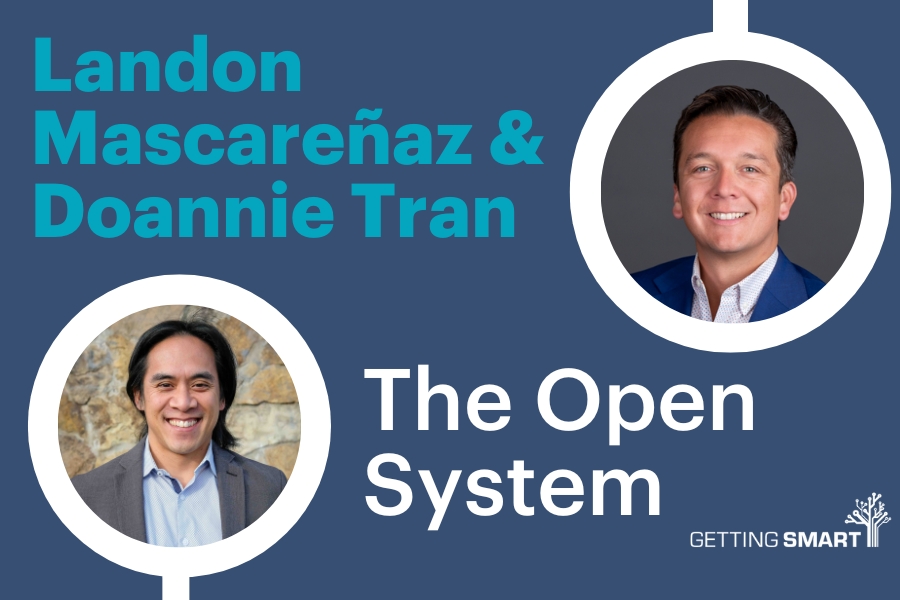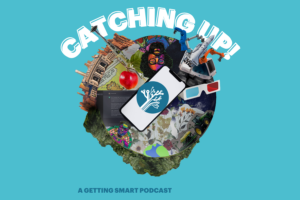Landon Mascareñaz and Doannie Tran on The Open System
Key Points
-
Ed leaders are public leaders that address system inequity and should understand their role in democracy.

On this episode of the Getting Smart Podcast Rebecca Midles is joined by Landon Mascareñaz an educator, writer, and vice president of community partnership at the Colorado Education Initiative. We’re also joined by Doannie Tran, a partner at the Center for Innovation in Education.
Their new book, The Open System: Redesigning Education and Reigniting Democracy makes the case that education is our greatest democracy-building endeavor, and through opening it up to the communities it serves and redesigning public systems, we can reimagine and reinvigorating our democracy and countless other shared pursuits of our society.
What are we apprenticing our young people to do, and apprenticing them to be?
Doannie Tran
Transcript
Rebecca Midles: You’re listening to the Getting Smart podcast. I’m Rebecca Midles, and today I’m joined by Landon Mascareñaz, an educator, writer, and Vice President of Community Partnership at the Colorado Education Initiative. We’re also joined by Doannie Tran, a partner at the Center for Innovation in Education. Their new book, The Open System: Redesigning Education and Reigniting Democracy, makes the case that education is our greatest democracy-building endeavor. By opening it up to the communities it serves and redesigning public systems, we can reimagine and reinvent our democracy and countless other shared pursuits of our society. Thank you both so much for being here.
Landon Mascareñaz and Doannie Tran: We’re thrilled to be here. Thanks for having us, Rebecca.
Rebecca Midles: I know you both attended Harvard Graduate School around the same time. Were you also in Teach for America at the same time? How do you know each other?
Landon Mascareñaz and Doannie Tran: Yes, we were both on staff at the same time but in different regions of the country. I was in Massachusetts, and Landon was in New Mexico. Interestingly, we didn’t meet until we went to graduate school. Doannie was living in Boston and served as an amazing local guide, showing me the great spots in Cambridge and Somerville. We bonded over big questions about the state of the education system, the efforts to change it, and where we felt challenges had persisted. Through our shared conversations and experiences, we built a friendship that eventually led us to create this project around The Open System.
Rebecca Midles: It must have been wonderful to share that cohort experience. I really enjoyed how your book speaks directly to practitioners and includes examples, strategies, and practical considerations. Often, when people write about leading change, they include case studies, but the processes involved get lost. You started the Open System Institute in 2019. What inspired you to write The Open System and place the practitioner at the center?
Landon Mascareñaz and Doannie Tran: We both come from practice backgrounds. Landon was a leader in Denver Public Schools, and I was one in Boston Public Schools. We found that big systems weren’t connecting effectively with their communities, and as a result, weren’t achieving the equitable outcomes we hoped for. We each started doing work in a different way, collaborating across boundaries. I focused on engaging teachers, communities, and students within Boston Public Schools, and Landon did incredible parent and community-facing work in Denver. As we compared notes, we realized we were onto something, which led to our first convening in 2019.
We brought together various people from across different roles—community organizers, district leaders, charter school leaders, and parents. They all shared a value-aligned interest in having a system that responded differently to its community. The language of “co-creation” was emerging at that time, and we built a schema around “open versus closed” systems. This concept gained even more relevance when the COVID pandemic hit, exposing vulnerabilities in our education system. The openers from our 2019 gathering began to innovate, and this led to a broader shared pursuit that you see reflected in the book.
Rebecca Midles: Your book organizes six principles into three stages: preparing, provoking, and propelling. Is this process linear or more cyclical? How does the readiness of a system affect these stages?
Landon Mascareñaz and Doannie Tran: We designed those three stages to help people understand what it means to lead in an open way and to architect systems toward openness. It’s both linear and cyclical—perhaps recursive. The “preparing” stage involves understanding your own inclinations and orientations toward openness as a leader and assessing the readiness of your community. “Provoking” involves acting in an open way around a specific opportunity, project, or context. But to avoid the pitfall of isolated projects, we move into the “propelling” stage, identifying new opportunities for openness across the system to create holistic change. This recursive loop allows leaders to build multiple iterations, guiding the system to act in a more open way over time.
Rebecca Midles: I agree—that’s essential for people to grasp. Sometimes a visual could help show the looping back, especially when new people join the work. You also describe educational leaders as public leaders who address systemic inequities and play a role in democracy. Can you elaborate on that?
Landon Mascareñaz and Doannie Tran: That’s a core concept in The Open System. Much of the infrastructure in public education is focused on the technical aspects of system management. But as leaders, especially principals who manage multi-million dollar taxpayer institutions, there’s also a significant public accountability. Many leaders want to be responsive to their communities, but they’re often afraid of political failure. Communities, on the other hand, sometimes don’t know where to push within the system to achieve meaningful change. If education is our democracy-building endeavor, we must equip leaders to engage with their communities in a democratic way. This book is designed to offer strategies for leaders to do just that.
Rebecca Midles: Sometimes we call that mindset “solutionary”—someone who sees opportunities for solutions. I think this ties into your principle of co-creation and community redesign. Could you share more examples of what that looks like?
Landon Mascareñaz and Doannie Tran: A great example is the work in Kentucky led by Commissioner Jason Glass. Dr. Glass recognized that the current assessment and accountability systems weren’t serving Kentuckians well, and he wanted to change that. With support from Lou Young, the chair of the Kentucky Board of Education, and input from the community, they found a perfect alignment between executive vision, public desire, and governance support. This created an “open moment” where all three forces worked together to push the work forward in a way that reflected the community’s needs.
Rebecca Midles: That’s a strong example. Often, superintendents are brought in to lead changes, but if the board doesn’t understand the process or timing, it can lead to misaligned expectations. Your book’s timeline and cyclical approach offer a great framework for guiding such processes.
Landon Mascareñaz and Doannie Tran: Exactly. In our book, we discuss co-creation as a promise and co-production as a commitment. Co-creation is the act of designing with community members, while co-production means involving them in implementation. A powerful example is from Boulder, Colorado, where Rob Anderson kept community members, including youth of color, involved in reimagining school safety. This approach builds trust and allows for adaptability as new insights emerge. We’ve also seen this model in Burlington, Vermont, where a guiding coalition of families and students is now part of the district’s ongoing strategic plan execution, providing input and accountability in a sustainable way.
Rebecca Midles: That works well when feedback is genuinely received. I remember reading that in your book. Vulnerability from leaders who acknowledge past mistakes invites true partnership.
Landon Mascareñaz and Doannie Tran: Yes, exactly. Openness requires vulnerability. When leaders acknowledge where they’ve fallen short, it builds trust and invites genuine collaboration.
Rebecca Midles: Your approach to vulnerability and openness is refreshing. It takes courage to admit past shortcomings, especially in leadership roles where people may expect you to have all the answers. How does that vulnerability play out in practice, especially with communities that might feel disenfranchised or unheard?
Landon Mascareñaz and Doannie Tran: Vulnerability in leadership is essential, particularly when working with communities that historically haven’t been listened to or respected. When leaders openly acknowledge mistakes or missteps, it signals to the community that this isn’t just another “top-down” approach. It allows people to feel like true partners in the process. For instance, a superintendent might say, “In the past, we’ve made decisions without fully understanding your needs. We’re here to change that, and we need your help to do it.” That approach invites community members to step in with their insights and experiences, creating a foundation for authentic collaboration.
Rebecca Midles: I love that framing. It’s about honoring the lived experiences of community members as valuable insights. That aligns well with your idea of co-creation. Can you talk about how leaders can build capacity for this kind of work within their teams and organizations?
Landon Mascareñaz and Doannie Tran: Building capacity for openness and co-creation requires leaders to model these behaviors consistently. Leaders must create an environment where it’s safe for their team members to take risks, make mistakes, and learn from them. This often means restructuring meetings, processes, and even decision-making frameworks to prioritize collaborative practices. Training and professional development are also critical. Staff need to understand the principles of community-centered leadership, and they need opportunities to practice these skills in real-world settings. Additionally, leaders can build partnerships with organizations that specialize in community engagement to help guide this work.
Rebecca Midles: That makes sense. Structuring the system to support co-creation allows the approach to be sustainable, rather than dependent on individual leaders. Speaking of sustainability, what advice would you give to leaders who want to adopt these principles but are concerned about time constraints or resource limitations?
Landon Mascareñaz and Doannie Tran: Time and resources are always a challenge, especially in education. However, an open system doesn’t necessarily require more resources—it requires rethinking how existing resources are allocated. For instance, instead of spending on traditional communication strategies, a district might invest in community liaisons who can build stronger, more direct connections with families and neighborhoods. Leaders should prioritize the work that brings the greatest impact, which often means shifting focus from short-term gains to long-term, community-centered approaches. This way, even with limited resources, leaders can create meaningful change by involving the community in a way that supports sustainable, lasting improvements.
Rebecca Midles: That’s practical advice. Focusing on the impact rather than just the process can help leaders make the most of their resources. As we wrap up, is there a final message or piece of advice you’d like to leave with our listeners?
Landon Mascareñaz and Doannie Tran: If there’s one takeaway from The Open System, it’s that education is not just about academic achievement—it’s about democracy and community. Schools have the unique potential to bring people together, to bridge divides, and to strengthen our shared democratic values. Leaders in education have a profound responsibility, not just to students but to the larger society. By committing to openness, leaders can create systems that truly reflect and serve their communities, fostering a sense of belonging, accountability, and empowerment. We hope readers and listeners are inspired to see education as a democracy-building endeavor and to act on that vision in their own communities.
Rebecca Midles: Thank you, Landon and Doannie, for sharing your insights today and for the impactful work you’re doing with The Open System. I think listeners will find a lot of inspiration and practical guidance in your book. I know I certainly have.
Landon Mascareñaz and Doannie Tran: Thank you, Rebecca. We’re grateful for this conversation and for the opportunity to share our work with the Getting Smart community.
Rebecca Midles: Thanks to everyone who joined us for this episode of the Getting Smart podcast. Until next time, keep learning, keep leading, and keep innovating.
Links:







0 Comments
Leave a Comment
Your email address will not be published. All fields are required.